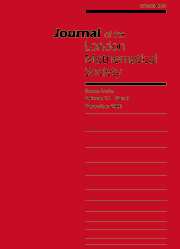Crossref Citations
This article has been cited by the following publications. This list is generated based on data provided by
Crossref.
Vallette, Bruno
2007.
Homology of generalized partition posets.
Journal of Pure and Applied Algebra,
Vol. 208,
Issue. 2,
p.
699.
Payne, Sam
2009.
Lattice polytopes cut out by root systems and the Koszul property.
Advances in Mathematics,
Vol. 220,
Issue. 3,
p.
926.
Reiner, Victor
and
Stamate, Dumitru Ioan
2010.
Koszul incidence algebras, affine semigroups, and Stanley–Reisner ideals.
Advances in Mathematics,
Vol. 224,
Issue. 6,
p.
2312.
Li, Liping
2013.
A generalized Koszul theory and its application.
Transactions of the American Mathematical Society,
Vol. 366,
Issue. 2,
p.
931.
QUINN, David
2013.
THE INCIDENCE ALGEBRA OF POSETS AND ACYCLIC CATEGORIES.
Kyushu Journal of Mathematics,
Vol. 67,
Issue. 1,
p.
117.
Shepler, Anne
and
Witherspoon, Sarah
2014.
A Poincaré-Birkhoff-Witt theorem for quadratic algebras with group actions.
Transactions of the American Mathematical Society,
Vol. 366,
Issue. 12,
p.
6483.
Li, Liping
2014.
A generalized Koszul theory and its relation to the classical theory.
Journal of Algebra,
Vol. 420,
Issue. ,
p.
217.
He, Ji-Wei
Van Oystaeyen, Fred
and
Zhang, Yinhuo
2015.
PBW deformations of Koszul algebras over a nonsemisimple ring.
Mathematische Zeitschrift,
Vol. 279,
Issue. 1-2,
p.
185.
Kloefkorn, Tyler
and
Shelton, Brad
2015.
Splitting algebras: Koszul, Cohen–Macaulay and numerically Koszul.
Journal of Algebra,
Vol. 422,
Issue. ,
p.
660.
Manea, Adrian
and
Ştefan, Dragoş
2017.
On Koszulity of finite graded posets.
Journal of Algebra and Its Applications,
Vol. 16,
Issue. 07,
p.
1750139.
Suárez, Héctor
2017.
Koszulity for graded skew PBW extensions.
Communications in Algebra,
Vol. 45,
Issue. 10,
p.
4569.
Margolis, Stuart
Saliola, Franco
and
Steinberg, Benjamin
2021.
Cell complexes, poset topology and the representation theory of algebras arising in algebraic combinatorics and discrete geometry.
Memoirs of the American Mathematical Society,
Vol. 274,
Issue. 1345,
Tosteson, Philip
2022.
Categorifications of rational Hilbert series and
characters of FSop modules.
Algebra & Number Theory,
Vol. 16,
Issue. 10,
p.
2433.
Fløystad, Gunnar
2023.
Shift modules, strongly stable ideals, and their dualities.
Transactions of the American Mathematical Society, Series B,
Vol. 10,
Issue. 21,
p.
670.
Li, Haonan
and
Wu, Quanshui
2023.
Generalized Koszul algebra and Koszul duality.
Journal of Algebra,
Vol. 619,
Issue. ,
p.
643.




